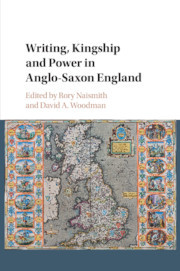Description
Writing, Kingship and Power in Anglo-Saxon England
Coordinators: Naismith Rory, Woodman David A.
This book brings together new research that represents current scholarship on the nexus between authority and written sources from Anglo-Saxon England.
Language: English
Subject for Writing, Kingship and Power in Anglo-Saxon England:
Writing, Kingship and Power in Anglo-Saxon England
Publication date: 06-2020
Support: Print on demand
Publication date: 06-2020
Support: Print on demand
Writing, Kingship and Power in Anglo-Saxon England
Publication date: 11-2017
Support: Print on demand
Publication date: 11-2017
Support: Print on demand
Description
/li>Contents
/li>Biography
/li>
The workings of royal and ecclesiastical authority in Anglo-Saxon England can only be understood on the basis of direct engagement with original texts and material artefacts. This book, written by leading experts, brings together new research that represents the best of the current scholarship on the nexus between authority and written sources from Anglo-Saxon England. Ranging from the seventh to the eleventh century, the chapters in this volume offer fresh approaches to a wide range of linguistic, historical, legal, diplomatic and palaeographical evidence. Central themes include the formation of power in early Anglo-Saxon kingdoms during the age of Bede (d. 735) and Offa of Mercia (757?96), authority and its articulation in the century from Edgar (959?75) to 1066, and the significance of books and texts in expressing power across the period. Writing, Kingship and Power in Anglo-Saxon England represents a critical resource for students and scholars alike with an interest in early medieval history from political, institutional and cultural perspectives.
1. Introduction Rory Naismith and David A. Woodman; 2. Simon Keynes: the man and the scholar Oliver Padel; Part I. The Formation of Power: The Early Anglo-Saxon Kingdom: 3. Bede's Kings Sarah Foot; 4. Hagiography and charters in early Northumbria David A. Woodman; 5. Origins of the kingdom of the English David N. Dumville; 6. Losing the plot? 'Filthy assertions' and 'unheard-of deceit' in Codex Carolinus 92 Jinty Nelson; Part II. Authority and its Articulation in Late Anglo-Saxon England: 7. Fathers and daughters: the case of Æthelred II Pauline Stafford; 8. The historian and Anglo-Saxon coinage: the case of late Anglo-Saxon England Rory Naismith; 9. Charters and exemption from geld in Anglo-Saxon England David Pratt; 10. On living in the time of tribulation: Archbishop Wulfstan's Sermo Lupi ad Anglos and its eschatological context Catherine Cubitt; 11. A tale of two charters: diploma production and political performance in Æthelredian England Levi Roach; Part III. Books, Texts and Power: 12. Making manifest God's judgement: interpreting ordeals in late Anglo-Saxon England Helen Foxhall Forbes; 13. An eleventh-century prayerbook for women? The origins and history of the Galba Prayerbook Julia Crick; 14. Writing Latin and Old English in tenth-century England: patterns, formula and language choice in the leases of Oswald of Worcester Francesca Tinti.
Rory Naismith is a lecturer in Medieval History at King's College, London. He is a Fellow of the Royal Historical Society, and author of Money and Power in Anglo-Saxon England: The Southern English Kingdoms 757–865 (Cambridge, 2012) and Medieval European Coinage (Cambridge, 2017).
David A. Woodman is a Fellow of Robinson College, Cambridge, where he is Director of Studies in History and Anglo-Saxon, Norse and Celtic. He is also a Fellow of the Royal Historical Society.
David A. Woodman is a Fellow of Robinson College, Cambridge, where he is Director of Studies in History and Anglo-Saxon, Norse and Celtic. He is also a Fellow of the Royal Historical Society.
© 2024 LAVOISIER S.A.S.
These books may interest you

Bede and the End of Time 61.25 €

The History of the Anglo-Saxons 39.35 €


